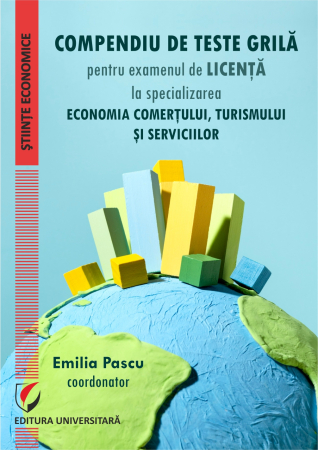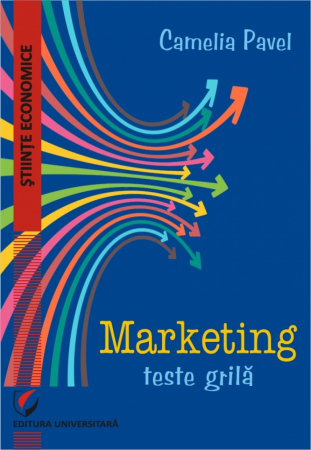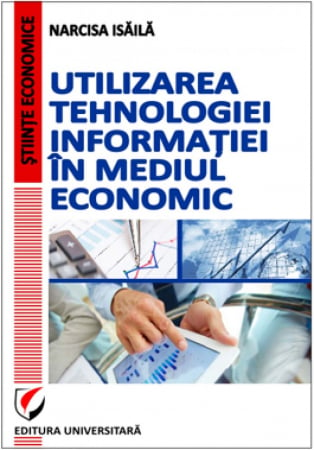Manuscript proposals: [email protected] / 0745 204 115 //// Tracking orders Individuals / Sales: 0745 200 357 / Orders Legal entities: 0721 722 783
Publisher: Editura Universitară
Author: Daniel Adrian Gardan
ISBN: 978-606-28-0544-9
DOI: 10.5682/9786062805449
Publisher year: 2017
Pages: 196
Product Code:
9786062805449
Do you need help?
0745 200 357
- Description
- Download (1)
- Authors
- Content
- More details
- Reviews (0)
Sport has represented and represents one of the most complex human activities, specific to each culture and civilization, throughout history.
The development of sport in general, seen as an integral part of a lifestyle, as well as sports branches dedicated to performance has been accelerated in the last half century against the background of the spectacular evolution of a multitude of aspects related to sports: materials and technologies used in equipment manufacturing. sports, the application of modern medical principles in sports, sports nutrition, psycho-motor recovery techniques, training methods, access to information for any sports lover, etc.
At the same time, in the development of sport, more and more sciences have made a direct contribution to the elucidation and definition of specific concepts, methods and tools, necessary for a scientific approach to modern sport.
For organizations present in the field of sports, whether we are talking about manufacturers of sports products or sports service providers, sports clubs, federations, organizers of sports events, etc., an approach to elucidate the main marketing concepts applied in sports and specific processes that allow these organizations to adapt to the marketing environment is welcome, especially since, in the context of the literature in our country, the approach to this field is limited.
The managers of sports organizations, athletes, marketing specialists and all those interested in this field will find in the pages of the paper completely new aspects, not addressed so far in our country, regarding the emotional involvement of sports consumers in consumption and the importance of the process. to create value by co-interesting consumers in the case of sports services.
Sports organizations operate in an increasingly competitive environment, and here we are not just talking about manufacturers of sports products or equipment that, naturally, are closer to a business model of the activity they do, but also about organizations in the category of sports clubs, federations, leagues or even about performance athletes themselves. The increasingly strong assertion of the features of the postmodern consumer in the last quarter of a century has given rise to sports consumption, characterized by an increased complexity in terms of dynamics of consumer needs, the ability to process information. and how to make the purchase decision. Thus, the management of sports organizations is currently called to respond to major challenges given the optimization of the response of their own organizations in relation to consumer requirements.
The paper is built starting from the desideratum of identifying the main particularities of the adaptation effort of the sports organizations to the dynamics of their own marketing environment.
The author manages to synthetically cover most important aspects and concepts in modern marketing, all viewed from the perspective of sport.
Throughout the 12 chapters of the book are approached successively, in a logical order, imposed by the need to explain marketing processes in their chain, a series of concepts that familiarize the reader with the strategic approach to marketing that must develop sports organizations.
The paper begins with an original analysis of the role that marketing can play in sports, the author drawing an interesting picture of the specificity of the application of marketing principles in sports. Not only the main moments when, from a conceptual point of view, it was possible to talk about sports marketing, but also the way in which the intensive and extensive development of marketing science could make possible the sufficiently significant customization of marketing notions to be managed properly. sports.
Once clarified the general framework in which marketing could be developed and applied in sports, the paper delimits the specifics of the marketing environment of sports organizations. All these elements support the impression according to which the author has assumed a pioneering role through the effort to elucidate, during the work, a multitude of particular aspects of the application of marketing in the field of sports.
Following is an interesting analysis of the issue of consumer behavior in sports, which is characterized by addressing the emotional implications that the consumption of sports products and services may have, after the reader is familiar with the marketing environment of organizations in the field. sport and the role that marketing can play in the context of this field.
The most used ways of implementing marketing research are clearly exposed, as well as the particularities that may appear in the process of studying the specific market of sports products and services.
Segmentation, positioning and elaboration of the marketing mix for sports organizations are also approached as fundamental processes, necessary for understanding the development of marketing strategies in the field of sports.
The main marketing policies are approached at the level of the paper, the content of each being customized from the perspective of specific phenomena that develop during the operationalization of the elements of the marketing mix in the activity of sports organizations. The very special role that sponsorship has in the economy of marketing in sports is underlined, because an impressive part of the total volume of sponsorships worldwide have been developed over time in the field of sports, this being considered by specialists. a real "channel" of promotion.
The development of sport in general, seen as an integral part of a lifestyle, as well as sports branches dedicated to performance has been accelerated in the last half century against the background of the spectacular evolution of a multitude of aspects related to sports: materials and technologies used in equipment manufacturing. sports, the application of modern medical principles in sports, sports nutrition, psycho-motor recovery techniques, training methods, access to information for any sports lover, etc.
At the same time, in the development of sport, more and more sciences have made a direct contribution to the elucidation and definition of specific concepts, methods and tools, necessary for a scientific approach to modern sport.
For organizations present in the field of sports, whether we are talking about manufacturers of sports products or sports service providers, sports clubs, federations, organizers of sports events, etc., an approach to elucidate the main marketing concepts applied in sports and specific processes that allow these organizations to adapt to the marketing environment is welcome, especially since, in the context of the literature in our country, the approach to this field is limited.
The managers of sports organizations, athletes, marketing specialists and all those interested in this field will find in the pages of the paper completely new aspects, not addressed so far in our country, regarding the emotional involvement of sports consumers in consumption and the importance of the process. to create value by co-interesting consumers in the case of sports services.
Sports organizations operate in an increasingly competitive environment, and here we are not just talking about manufacturers of sports products or equipment that, naturally, are closer to a business model of the activity they do, but also about organizations in the category of sports clubs, federations, leagues or even about performance athletes themselves. The increasingly strong assertion of the features of the postmodern consumer in the last quarter of a century has given rise to sports consumption, characterized by an increased complexity in terms of dynamics of consumer needs, the ability to process information. and how to make the purchase decision. Thus, the management of sports organizations is currently called to respond to major challenges given the optimization of the response of their own organizations in relation to consumer requirements.
The paper is built starting from the desideratum of identifying the main particularities of the adaptation effort of the sports organizations to the dynamics of their own marketing environment.
The author manages to synthetically cover most important aspects and concepts in modern marketing, all viewed from the perspective of sport.
Throughout the 12 chapters of the book are approached successively, in a logical order, imposed by the need to explain marketing processes in their chain, a series of concepts that familiarize the reader with the strategic approach to marketing that must develop sports organizations.
The paper begins with an original analysis of the role that marketing can play in sports, the author drawing an interesting picture of the specificity of the application of marketing principles in sports. Not only the main moments when, from a conceptual point of view, it was possible to talk about sports marketing, but also the way in which the intensive and extensive development of marketing science could make possible the sufficiently significant customization of marketing notions to be managed properly. sports.
Once clarified the general framework in which marketing could be developed and applied in sports, the paper delimits the specifics of the marketing environment of sports organizations. All these elements support the impression according to which the author has assumed a pioneering role through the effort to elucidate, during the work, a multitude of particular aspects of the application of marketing in the field of sports.
Following is an interesting analysis of the issue of consumer behavior in sports, which is characterized by addressing the emotional implications that the consumption of sports products and services may have, after the reader is familiar with the marketing environment of organizations in the field. sport and the role that marketing can play in the context of this field.
The most used ways of implementing marketing research are clearly exposed, as well as the particularities that may appear in the process of studying the specific market of sports products and services.
Segmentation, positioning and elaboration of the marketing mix for sports organizations are also approached as fundamental processes, necessary for understanding the development of marketing strategies in the field of sports.
The main marketing policies are approached at the level of the paper, the content of each being customized from the perspective of specific phenomena that develop during the operationalization of the elements of the marketing mix in the activity of sports organizations. The very special role that sponsorship has in the economy of marketing in sports is underlined, because an impressive part of the total volume of sponsorships worldwide have been developed over time in the field of sports, this being considered by specialists. a real "channel" of promotion.
-
Marketing in sport
Download
DANIEL ADRIAN GARDAN
PREFACE / 9
CHAPTER 1. THE ROLE OF MARKETING IN SPORT / 13
CHAPTER 2. MARKETING ENVIRONMENT OF SPORTS ORGANIZATIONS / 22
CHAPTER 3. PARTICULARS OF CONSUMER BEHAVIOR IN SPORT / 31
3.1. Defining features of consumer behavior in sports / 31
3.2. Peculiarities of the consumer decision-making process in sports / 36
3.3. Typology of consumers in sports / 43
3.4. The emotional implications of consuming sports products and events / 47
CHAPTER 4. MARKETING RESEARCH IN THE FIELD OF SPORT / 55
4.1. The importance of marketing research in the field of sports / 55
4.2. The process of marketing research in the field of sports / 58
4.3. Data sources in marketing research / 60
4.4. Research methods used for primary data collection / 64
4.5. Considerations regarding the application of marketing research in the field of sports / 70
CHAPTER 5. POSITIONING AND MARKETING MIX OF ORGANIZATIONS PRODUCING SPORTS PRODUCTS AND PROVIDERS OF SPORTS SERVICES / 73
5.1. Market segmentation of sports organizations / 74
5.2. Choice of target market segments in the case of sports organizations / 79
5.3. The process of positioning on the market in the case of sports organizations / 80
5.4. Peculiarities of the marketing mix in the case of sports organizations / 84
CHAPTER 6. PRODUCT POLICY IN THE CASE OF MARKETING IN SPORT / 88
6.1. Specific characteristics of the sports product / 88
6.2. Development of new products / 94
6.3. Product life cycle / 97
6.4. Use of brands in the field of sports / 101
CHAPTER 7. PRICE POLICY IN THE CASE OF MARKETING IN SPORT / 105
7.1. The role of price in the marketing mix / 105
7.2. Pricing process / 106
7.3. Price determining factors / 109
7.4. Pricing strategies / 114
CHAPTER 8. DISTRIBUTION POLICY FOR SPORT MARKETING / 119
8.1. Distribution and logistics channels in the field of sports / 119
8.2. Distribution features adapted to the typology of consumers / 125
8.3. Retail and the implications of the Internet in the distribution of sports products and services / 128
CHAPTER 9. SPORTS MARKETING PROMOTION POLICY / 131
9.1. Communication in marketing in the field of sports and establishing the promotional mix / 131
9.2. The planning process of the promotional activities / 135
9.3. Features of promotion techniques used in sports / 137
9.3.1. Advertising / 137
9.3.2. Sales promotion / 139
9.3.3. Direct marketing / 140
9.3.4. Public relations / 143
9.3.5. Personal contact / 144
9.3.6. Promotion by association with the image of sports celebrities (endorsement) / 145
CHAPTER 10. SPONSORSHIP - SPORT AS A MEANS OF PROMOTION / 147
10.1. Sponsorship - history and content / 147
10.2. Use of sports sponsorship / 154
CHAPTER 11. PERSONNEL AND ROLE IN THE CASE OF MARKETING IN SPORT / 159
11.1. The importance of personnel in sports / 159
11.2. Staff relations with clients in applied marketing in the field of sports and the process of co-creation of value / 163
11.3. Categories of staff met in the field of sports / 169
11.4. The process of managing the staff of sports organizations / 173
11.5. Staff motivation and its importance in the context of the activity of sports organizations / 178
CHAPTER 12. FUTURE TRENDS REGARDING MARKETING IN SPORT / 185
BIBLIOGRAPHY / 191
CHAPTER 1. THE ROLE OF MARKETING IN SPORT / 13
CHAPTER 2. MARKETING ENVIRONMENT OF SPORTS ORGANIZATIONS / 22
CHAPTER 3. PARTICULARS OF CONSUMER BEHAVIOR IN SPORT / 31
3.1. Defining features of consumer behavior in sports / 31
3.2. Peculiarities of the consumer decision-making process in sports / 36
3.3. Typology of consumers in sports / 43
3.4. The emotional implications of consuming sports products and events / 47
CHAPTER 4. MARKETING RESEARCH IN THE FIELD OF SPORT / 55
4.1. The importance of marketing research in the field of sports / 55
4.2. The process of marketing research in the field of sports / 58
4.3. Data sources in marketing research / 60
4.4. Research methods used for primary data collection / 64
4.5. Considerations regarding the application of marketing research in the field of sports / 70
CHAPTER 5. POSITIONING AND MARKETING MIX OF ORGANIZATIONS PRODUCING SPORTS PRODUCTS AND PROVIDERS OF SPORTS SERVICES / 73
5.1. Market segmentation of sports organizations / 74
5.2. Choice of target market segments in the case of sports organizations / 79
5.3. The process of positioning on the market in the case of sports organizations / 80
5.4. Peculiarities of the marketing mix in the case of sports organizations / 84
CHAPTER 6. PRODUCT POLICY IN THE CASE OF MARKETING IN SPORT / 88
6.1. Specific characteristics of the sports product / 88
6.2. Development of new products / 94
6.3. Product life cycle / 97
6.4. Use of brands in the field of sports / 101
CHAPTER 7. PRICE POLICY IN THE CASE OF MARKETING IN SPORT / 105
7.1. The role of price in the marketing mix / 105
7.2. Pricing process / 106
7.3. Price determining factors / 109
7.4. Pricing strategies / 114
CHAPTER 8. DISTRIBUTION POLICY FOR SPORT MARKETING / 119
8.1. Distribution and logistics channels in the field of sports / 119
8.2. Distribution features adapted to the typology of consumers / 125
8.3. Retail and the implications of the Internet in the distribution of sports products and services / 128
CHAPTER 9. SPORTS MARKETING PROMOTION POLICY / 131
9.1. Communication in marketing in the field of sports and establishing the promotional mix / 131
9.2. The planning process of the promotional activities / 135
9.3. Features of promotion techniques used in sports / 137
9.3.1. Advertising / 137
9.3.2. Sales promotion / 139
9.3.3. Direct marketing / 140
9.3.4. Public relations / 143
9.3.5. Personal contact / 144
9.3.6. Promotion by association with the image of sports celebrities (endorsement) / 145
CHAPTER 10. SPONSORSHIP - SPORT AS A MEANS OF PROMOTION / 147
10.1. Sponsorship - history and content / 147
10.2. Use of sports sponsorship / 154
CHAPTER 11. PERSONNEL AND ROLE IN THE CASE OF MARKETING IN SPORT / 159
11.1. The importance of personnel in sports / 159
11.2. Staff relations with clients in applied marketing in the field of sports and the process of co-creation of value / 163
11.3. Categories of staff met in the field of sports / 169
11.4. The process of managing the staff of sports organizations / 173
11.5. Staff motivation and its importance in the context of the activity of sports organizations / 178
CHAPTER 12. FUTURE TRENDS REGARDING MARKETING IN SPORT / 185
BIBLIOGRAPHY / 191
Sport has represented and represents one of the most complex human activities, specific to each culture and civilization, throughout history.
The development of sport in general, seen as an integral part of a lifestyle, as well as sports branches dedicated to performance has been accelerated in the last half century against the background of the spectacular evolution of a multitude of aspects related to sports: materials and technologies used in equipment manufacturing. sports, the application of modern medical principles in sports, sports nutrition, psycho-motor recovery techniques, training methods, access to information for any sports lover, etc.
At the same time, in the development of sport, more and more sciences have made a direct contribution to the elucidation and definition of specific concepts, methods and tools, necessary for a scientific approach to modern sport.
For organizations present in the field of sports, whether we are talking about manufacturers of sports products or sports service providers, sports clubs, federations, organizers of sports events, etc., an approach to elucidate the main marketing concepts applied in sports and specific processes that allow these organizations to adapt to the marketing environment is welcome, especially since, in the context of the literature in our country, the approach to this field is limited.
The managers of sports organizations, athletes, marketing specialists and all those interested in this field will find in the pages of the paper completely new aspects, not addressed so far in our country, regarding the emotional involvement of sports consumers in consumption and the importance of the process. to create value by co-interesting consumers in the case of sports services.
Sports organizations operate in an increasingly competitive environment, and here we are not just talking about manufacturers of sports products or equipment that, naturally, are closer to a business model of the activity they do, but also about organizations in the category of sports clubs, federations, leagues or even about performance athletes themselves. The increasingly strong assertion of the features of the postmodern consumer in the last quarter of a century has given rise to sports consumption, characterized by an increased complexity in terms of dynamics of consumer needs, the ability to process information. and how to make the purchase decision. Thus, the management of sports organizations is currently called to respond to major challenges given the optimization of the response of their own organizations in relation to consumer requirements.
The paper is built starting from the desideratum of identifying the main particularities of the adaptation effort of the sports organizations to the dynamics of their own marketing environment.
The author manages to synthetically cover most important aspects and concepts in modern marketing, all viewed from the perspective of sport.
Throughout the 12 chapters of the book are approached successively, in a logical order, imposed by the need to explain marketing processes in their chain, a series of concepts that familiarize the reader with the strategic approach to marketing that must develop sports organizations.
The paper begins with an original analysis of the role that marketing can play in sports, the author drawing an interesting picture of the specificity of the application of marketing principles in sports. Not only the main moments when, from a conceptual point of view, it was possible to talk about sports marketing, but also the way in which the intensive and extensive development of marketing science could make possible the sufficiently significant customization of marketing notions to be managed properly. sports.
Once clarified the general framework in which marketing could be developed and applied in sports, the paper delimits the specifics of the marketing environment of sports organizations. All these elements support the impression according to which the author has assumed a pioneering role through the effort to elucidate, during the work, a multitude of particular aspects of the application of marketing in the field of sports.
Following is an interesting analysis of the issue of consumer behavior in sports, which is characterized by addressing the emotional implications that the consumption of sports products and services may have, after the reader is familiar with the marketing environment of organizations in the field. sport and the role that marketing can play in the context of this field.
The most used ways of implementing marketing research are clearly exposed, as well as the particularities that may appear in the process of studying the specific market of sports products and services.
Segmentation, positioning and elaboration of the marketing mix for sports organizations are also approached as fundamental processes, necessary for understanding the development of marketing strategies in the field of sports.
The main marketing policies are approached at the level of the paper, the content of each being customized from the perspective of specific phenomena that develop during the operationalization of the elements of the marketing mix in the activity of sports organizations. The very special role that sponsorship has in the economy of marketing in sports is underlined, because an impressive part of the total volume of sponsorships worldwide have been developed over time in the field of sports, this being considered by specialists. a real "channel" of promotion.
The role that the staff of the organizations present in the field of sports can have is explained by the author, emphasizing the relationship with customers and the process of co-creation of value, extremely interesting elements to approach from the perspective of sports consumption and consumer involvement. sports in this process.
The paper addresses a wide circle of readers, consisting of students, teachers, researchers and practitioners both in the economic field, specific to marketing and, equally, in the field of sports.
Through his approach and his own ideas advanced throughout the paper, the author provides a useful tool for decision makers in the field of sports, in an effort to identify elements and nuances useful for understanding the complexity of applying marketing concepts in sports.
Prof. univ. emeritus, Dr. h.c. Iacob Catoiu
Faculty of Marketing - ASE Bucharest
The development of sport in general, seen as an integral part of a lifestyle, as well as sports branches dedicated to performance has been accelerated in the last half century against the background of the spectacular evolution of a multitude of aspects related to sports: materials and technologies used in equipment manufacturing. sports, the application of modern medical principles in sports, sports nutrition, psycho-motor recovery techniques, training methods, access to information for any sports lover, etc.
At the same time, in the development of sport, more and more sciences have made a direct contribution to the elucidation and definition of specific concepts, methods and tools, necessary for a scientific approach to modern sport.
For organizations present in the field of sports, whether we are talking about manufacturers of sports products or sports service providers, sports clubs, federations, organizers of sports events, etc., an approach to elucidate the main marketing concepts applied in sports and specific processes that allow these organizations to adapt to the marketing environment is welcome, especially since, in the context of the literature in our country, the approach to this field is limited.
The managers of sports organizations, athletes, marketing specialists and all those interested in this field will find in the pages of the paper completely new aspects, not addressed so far in our country, regarding the emotional involvement of sports consumers in consumption and the importance of the process. to create value by co-interesting consumers in the case of sports services.
Sports organizations operate in an increasingly competitive environment, and here we are not just talking about manufacturers of sports products or equipment that, naturally, are closer to a business model of the activity they do, but also about organizations in the category of sports clubs, federations, leagues or even about performance athletes themselves. The increasingly strong assertion of the features of the postmodern consumer in the last quarter of a century has given rise to sports consumption, characterized by an increased complexity in terms of dynamics of consumer needs, the ability to process information. and how to make the purchase decision. Thus, the management of sports organizations is currently called to respond to major challenges given the optimization of the response of their own organizations in relation to consumer requirements.
The paper is built starting from the desideratum of identifying the main particularities of the adaptation effort of the sports organizations to the dynamics of their own marketing environment.
The author manages to synthetically cover most important aspects and concepts in modern marketing, all viewed from the perspective of sport.
Throughout the 12 chapters of the book are approached successively, in a logical order, imposed by the need to explain marketing processes in their chain, a series of concepts that familiarize the reader with the strategic approach to marketing that must develop sports organizations.
The paper begins with an original analysis of the role that marketing can play in sports, the author drawing an interesting picture of the specificity of the application of marketing principles in sports. Not only the main moments when, from a conceptual point of view, it was possible to talk about sports marketing, but also the way in which the intensive and extensive development of marketing science could make possible the sufficiently significant customization of marketing notions to be managed properly. sports.
Once clarified the general framework in which marketing could be developed and applied in sports, the paper delimits the specifics of the marketing environment of sports organizations. All these elements support the impression according to which the author has assumed a pioneering role through the effort to elucidate, during the work, a multitude of particular aspects of the application of marketing in the field of sports.
Following is an interesting analysis of the issue of consumer behavior in sports, which is characterized by addressing the emotional implications that the consumption of sports products and services may have, after the reader is familiar with the marketing environment of organizations in the field. sport and the role that marketing can play in the context of this field.
The most used ways of implementing marketing research are clearly exposed, as well as the particularities that may appear in the process of studying the specific market of sports products and services.
Segmentation, positioning and elaboration of the marketing mix for sports organizations are also approached as fundamental processes, necessary for understanding the development of marketing strategies in the field of sports.
The main marketing policies are approached at the level of the paper, the content of each being customized from the perspective of specific phenomena that develop during the operationalization of the elements of the marketing mix in the activity of sports organizations. The very special role that sponsorship has in the economy of marketing in sports is underlined, because an impressive part of the total volume of sponsorships worldwide have been developed over time in the field of sports, this being considered by specialists. a real "channel" of promotion.
The role that the staff of the organizations present in the field of sports can have is explained by the author, emphasizing the relationship with customers and the process of co-creation of value, extremely interesting elements to approach from the perspective of sports consumption and consumer involvement. sports in this process.
The paper addresses a wide circle of readers, consisting of students, teachers, researchers and practitioners both in the economic field, specific to marketing and, equally, in the field of sports.
Through his approach and his own ideas advanced throughout the paper, the author provides a useful tool for decision makers in the field of sports, in an effort to identify elements and nuances useful for understanding the complexity of applying marketing concepts in sports.
Prof. univ. emeritus, Dr. h.c. Iacob Catoiu
Faculty of Marketing - ASE Bucharest
If you want to express your opinion about this product you can add a review.
write a review

6359.png)
![Sports Marketing - Daniel Adrian Gardan [1] Sports Marketing - Daniel Adrian Gardan [1]](https://gomagcdn.ro/domains/editurauniversitara.ro/files/product/large/marketing-in-sport-475-874372.jpg)














